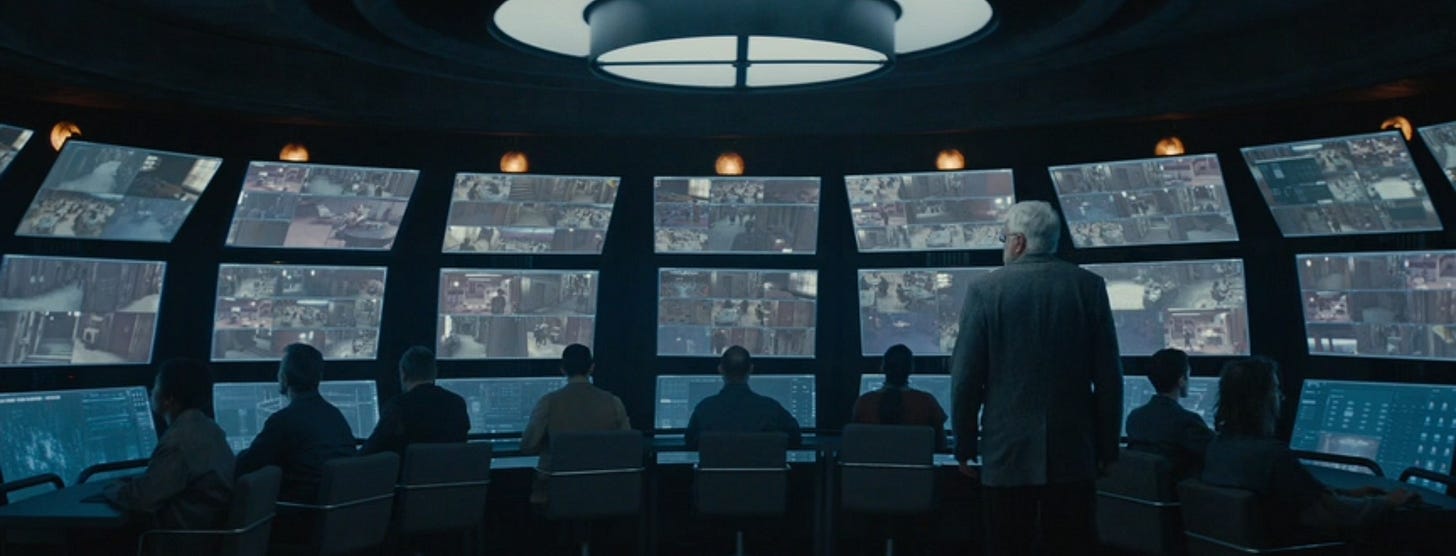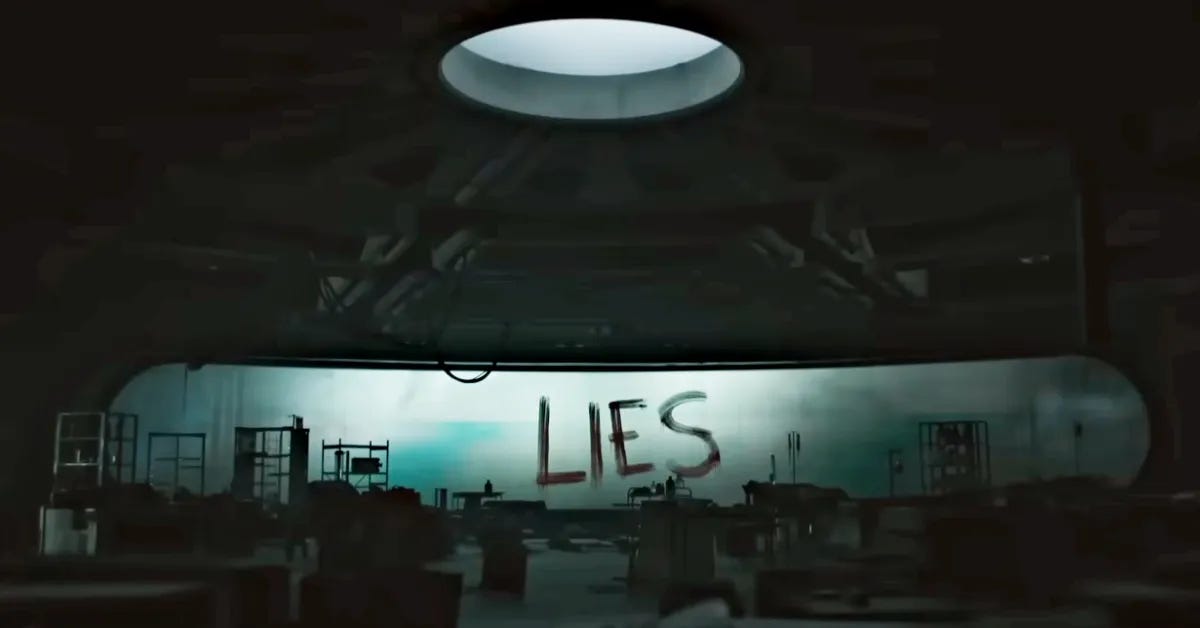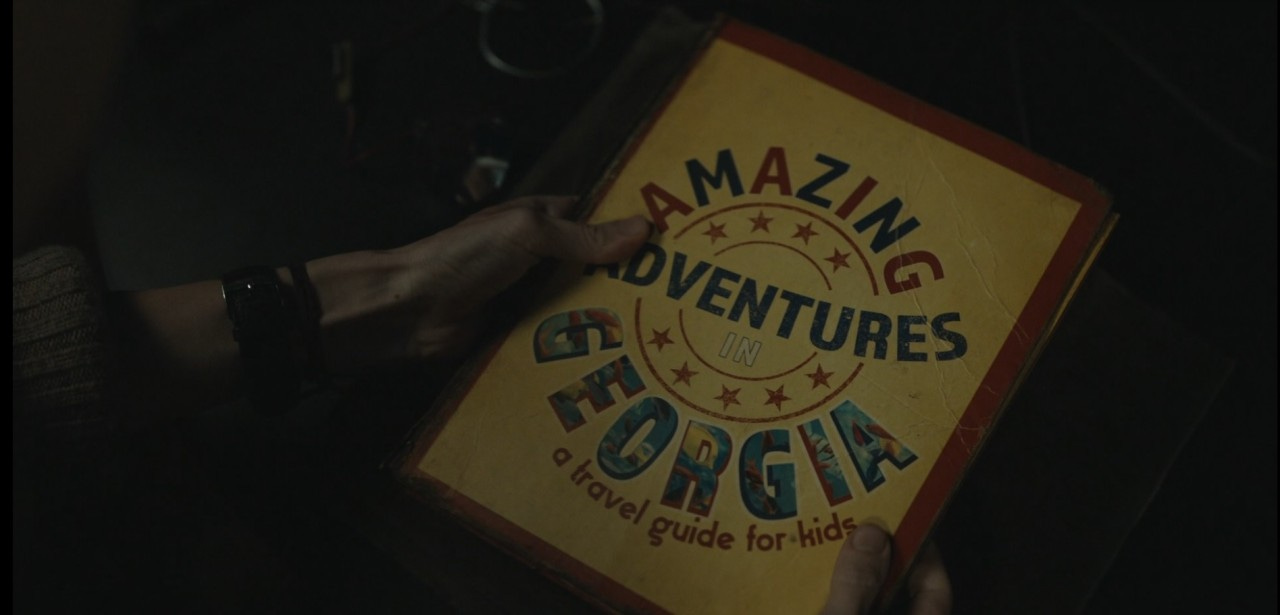planning for a post-apocalyptic world
a nerd's notes on Silo, Fahrenheit 451, George Orwell, and more
I’ve spent first few days of 2025 wrapped in fleece, shivering from fever-induced chills, whining about headaches while my eyes glued themselves to screens. When I had the energy to stand, I would stick my face in front of the air fryer for some much-needed relief. I crank it up to 400° and leave the double-doors wide open to enjoy some manufactured warmth. What once was a culinary revolution is now a personal space heater. I digress…
In my vegetated state, I’ve also spent quite some time digging into one of my recent obsessions: Silo. For the unfamiliar, Silo is an Apple TV+ series based off the titular book by Hugh Howey. I absolutely love it; the art direction is impeccable, the soundtrack is chilling, and the storyline is quite complex. It centers around the idea that 10,000 people live underground in a “silo”, a cylindrical self-sustaining habitat that exists some hundreds of years post-apocalypse. They are governed by certain key figures, like the Mayor, Judge, Sheriffs, and feature important sectors that are vital to the survival of the people, like Mechanical, Supply, IT, Farmers, etc. The series unfolds almost like a murder-myster of sorts, with increasingly looming questions of suspicion: why are we here, who is in actually charge, and what is the truth?
In this post, I take a closer examination of four foundational concepts of the Silo world and how they beg deeper questions in our current society:
surveillance: panopticons, cameras and security systems, Orwell’s 1984, and more
governance: authoritarianism through technology, Harari’s Homo Deus and relics
truth: Bradbury’s Fahrenheit 451, Asimov’s The Last Question and curiosity
survival: egoistic altruism, Kurzgesagt’s The Last Human, and extraterrestrial life
i’m feeling lucky
This month’s playlist is chaotic: a mix of multiple genres, high and low intensities, and contrasting sounds. I really don’t know if you’ll enjoy the whole thing, but you’ll definitely enjoy something. There’s some wisdom in that… somewhere.
[Archive playlist can be found here, and in my spotify bio]
[Silo spoilers below, proceed with caution]
on surveillance:
The elite control in Silo mirrors real-world systems of surveillance where the privileged few wield disproportionate power over the masses. We quickly learn that they are being watched over, through hidden cameras behind one-way mirrors. Somewhat of a dystopian panopticon, the Silo inhabitants are under constant watch, without consent. In a general sense, surveillance in the Silo follows Foucault’s idea of “visibility is a trap.”
Jeremy Bentham’s Panopticon: This was like low-hanging fruit, from the moment I saw the spiral-like structure of the Silo combined with hidden surveillance and elitist organization, I was sure of the existence of some metaphorical panopticon in Silo. Bentham’s “Panopticon” is a circular building with a central guard tower that can look into all the cells lining the perimeter. The unseen watchers maintain control while the residents self-police, mirroring Bentham’s idea that “morals reformed, health preserved, industry invigorated” are tools for systemic control.
David Eggers’ The Circle: Again, a simple correlation between the one-way-mirror clad cameras in the Silo, and the tiny circular cameras of the The Circle. Eggers envisions a society where privacy is eradicated by a corporate panopticon, where “secrets are lies.” This also parallels the Silo suppression of personal autonomy under the guise of communal benefit. The one concept that this starts to lean into, and that I’ll get to in a sec, is the governance of the surveilling eye. Who is in charge of this view? And moreover, who does this surveillance benefit? I think about this in a very real-world way, where we have the means to catch the killer of a CEO and also the silent recording buzz of microphones and cameras. Not even in a sinister manner; see also — girl in Portugal capturing a meteor in the night sky… According to GSMA intelligence, there are roughly 15 billion phones in the world - to think of the autonomous recording potentional is a bit harrowing.
George Orwell’s 1984 and Sartre’s The Other: I grouped these together because I feel like “Big Brother” from 1984 and the concept of the “The Other” instills the idea that surveillance defines behavior and enforces order. Both of these are sort of figureheads for constant surveillance and control, much like the surveillance of cameras and watchers in Silo. It’s the threat of being watched, that essentially reduces people to their roles within a rigid hierarchy.
David Brin’s The Transparent Society: In Brin’s 1999 work, he argues for mutual transparency — if the watchers are also watched, power imbalances can be mitigated. Silo subverts this idea; transparency is tightly controlled, leaving residents in ignorance. Ignorance breeds authority. I’ll get to that later in the section about truth.
on governance:
We quickly learn that the IT Department in the Silo is not quite what it seems to be, especially with the Head of IT acting as a double-agent with untrustable actions. As we discover more about the hierarchy of governance and poke holes in the system’s structure, we see a clear inequality between leadership and the inhabitants.
Yuval Noah Harari’s Homo Deus: One of the ways in which governance becomes a cakewalk, is through deployment of technology. And I recently came across Homo Deus, where Harari warns of a trajectory where humans, reduced to algorithms, may become obsolete in a world dominated by AI/technology/data. In season 2 of Silo, we learn that the governance of the people and establishment of order comes from the legacy — a higher intelligence being, akin to an AI processor. While there are humans in charge of maintaining that order and peace, the legacy dictates the parameters of freedom and information discharge. The final chapter of Homo Deus foreshadows such a potential universe, where humans become disenfranchised with humanistic ideals and render themselves obsolete at the helm of big data. The final line in the book reads: "What will happen to society, politics and daily life when non-conscious but highly intelligent algorithms know us better than we know ourselves?"
Naomi Klein’s The Shock Doctrine: Naomi Klein’s The Shock Doctrine provides a chilling framework for understanding how crises — real, fabricated, or exaggerated — can be exploited to consolidate power, strip rights, and impose systems of control. In Silo, the remnants of a catastrophic event (presumably environmental collapse or technological disaster) serve as the foundational crisis. This allows the silo's elite to impose strict hierarchies, regulate information, and normalize surveillance as necessary measures for survival. The key, also, is that the crisis is never fully explained to the Silo residents, meaning they live in a collective mystery. But that works in favor of authoritarian governance, and aligns with Klein's idea that crises are also opportunities for those in power to rewrite societal rules in their favor. ALSO: Residents are left with fragments of the past, labeled as relics or myths, much like Klein describes how trauma is used to disorient and prevent resistance. Governance in the Silo translates to keeping truths uncovered and lies bought easily.
on truth, or the lack thereof:
A lot of ideas from my points on governance could be copy-pasted as ideas on how truth is manipulated/concealed in order to maintain hierarchy. But there’s a larger concept of discouraging curiosity or dissent by framing knowledge as dangerous rather than empowering. That’s why when the main character and others start to ask looming questions that challenge the order of the Silo, we’re invited to go against the grain. And so the storyline becomes all about asking the right questions.
Isaac Asimov’s The Last Question: I absolutely love The Last Question. It’s a poignant short story that explores humanity’s eternal quest for knowledge and the ultimate answers to existence, framed by the limitations of technology and time. Each time the characters in Asimov’s ask their world’s “AI Computer” of the possibility of entropy reversal, it responds with “THERE IS AS YET INSUFFICIENT DATA FOR A MEANINGFUL ANSWER.” This is seemingly the same answer that anyone gets when they ask pertinent questions in the Silo. No figure of authority or resident veteran has enough answers to launch an efficient train of thought. Information remains limited and scarce, to maintain a fragile status quote, through the classification of relics and the hidden truths of the outside. Asimov hints at the idea that when humans encounter the unknown, destabilization ensues — that remains true in the Silo.
Ray Bradbury’s Fahrenheit 451: Bradbury’s dystopia burns books to cleanse society of conflicting ideas, with firemen becoming agents of suppression. The Silo also poses restrictions on information, which are designed to “protect” its residents from destabilizing truths. And while the Silo has its own weird blend of culture and tradition, it’s also evident that the absence of knowledge has created cultural stagnation. The people of the Silo don’t know about Romeo and Juliet, although the main character’s name comes from the Shakespeare play. We also learn that they literally burned books in order to create such an intellectual stagnation. But both stories do this as a means of protecting the populace from a perceived chaos of conflicting ideas. Truth becomes more about belief, rather than knowledge.
on survival:
The mantra in Silo, “Your actions will benefit everyone,” serves as a justification for communal sacrifice and individual duty, but it also raises questions about the authenticity of such claims. Does everyone truly benefit, or are the sacrifices of the many exploited to sustain the power of the few? They definitely try to sell the perception of a positive-sum game but the unseen power structures make the “benefit” unevenly distributed. So, as the plot thickens, the society becomes more individualistic, divisive, and survival-oriented. As questions dig deeper and break heirarchical standards, survival becomes a means to an end, not so much an endgame.
Kurzgesagt’s “The Last Human” and “Egoistic Altruism”: Kuzgesagt is awesome. Their exploration of egoistic altruism and the moral responsibility toward future generations resonates deeply with the silo’s survival framework. The idea that “quadrillions of unborn humans are at our mercy” mirrors the Silo’s emphasis on sustaining a delicate balance for the sake of the future. BUT, while Kurzgesagt frames this responsibility as a moral imperative, Silo presents a darker side: a system where individuals are coerced into compliance under the guise of altruism. Not so nice.
The Genesis Project by Claudius Gros: One of the obvious concepts of Silo is that of post-apocalyptic survival, resulting in a sub-terranean, self-sustaining habitat that fuels the lives of thousands, for seemingly forever. every resource, role, and function is carefully orchestrated to sustain life in isolation. Genesis Project explores the idea of seeding exoplanets with terrestrial life forms to establish ecosystems where none exist. Gros suggests that human ingenuity can create life in inhospitable conditions, which is supposedly the case for life outside the silo. But part of Gros’ project is rooted in the hope of fostering diversity and complexity, while the silo’s rigid hierarchy stifles those principles. So that leads me to wonder whether survival systems should prioritize preservation or innovation — and what might be lost in choosing one over the other.
link dump
just in case you wanted to live in an underground silo
have you ever thought of ranking apples?
the most controversial game on the internet
an incredibly poignant short film
have you tried using google maps on competitive mode?
insane look at a firefighter’s POV
This post makes me feel like a big nerd; in a good way. There’s something I love about compiling different sources of brilliant work to form a more holistic storyline or dig towards a correlating theories. I truly enjoyed re-reading some of these pieces and I’ve included many links so you can dig through for yourself. [More on Silo, if you’re interested: link 1, link 2, link 3] I’d love to hear your thoughts on any of this post-apocalypse life, and what other rabbit holes I should look into!
This is unlike the usual monthly newsletter for loaf of thought, but like I said in December, things might change around here. We might embrace uncertainty a bit more. And seemingly so, 2025 is off to an unexpected, and honestly, rough start — lot’s of mayhem and disruption. I hope you are staying safe, warm, and loved. Stay tuned for my next post: a convo about nostalgia-infused branding and marketing.
have a lovely january, folks.
if you missed my last post of 2024, here it is:











this show is truly amazing and I've really enjoyed catching all the references -- some i have read or just heard about. dunno why but this season felt slower, and frankly, a bit boring at times.. 🤷🏻♀️
oh, and get well soon!!!
Hope you feel better soon!